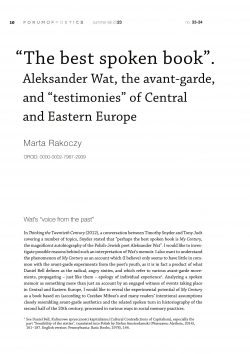
Marta Rakoczy
A b s t r a k t
Analyzing Alexander Wat’s My Century as more than an account of an engaged participant in the events of Central and Eastern Europe, I would like to show its experimental potential, close to avant-garde aesthetics. This potential, in my opinion, was part of an extensive institutional-discursive field, as it was related to the oral turn in historiography of the second half of the 20th century processed in various ways in the social politics of memory. In my interpretation, Wat’s oral memoir was neither a fictional creation nor a non-fictional “testimony”. It was a genre of verbal creativity, which demanded in-depth reflection on its social location and meaning. In the case of My Age, it was necessary to perceive in the events happening between the actors negotiating the conversation with each other and the various story genres they activated. These events were full of ambivalence, tensions and negotiations that took place in the field of genres of uttering experience, the institutions that initiate them and their politically, socially and culturally empowered actors and discourses. They were also based on culturally and socially defined policies of retrieving, reclaiming, restoring, evoking or silencing memories, and the intentional and genre choices of Wat himself. Wat and Milosz opted for, as Alessandro Portelli characterized oral history in 1998, “dialogic shaping of discourse”, “rich heteroglossia” and “sequences of verbal processes and […] constructs generated by cultural and personal encounters”. In this article I want to show that this heteroglossia provoked different memory policies. It also constructed different ideologies of the voice of Central and Eastern European intellectuals.





